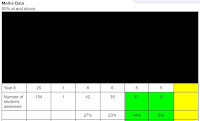Students as Creators
Amplifying Maths Learning Through Quiz Design In our classroom, we believe students learn best when they become creators of knowledge rather than simply consumers of it. This term, our maths focus on measurement provided the perfect opportunity to put this belief into practice. Instead of completing a traditional test, students were challenged to design and share their very own maths quiz. The task was simple but powerful: create 5–10 accurate and well-thought-out questions on topics we had explored in measurement. But the real excitement came from how they brought their quizzes to life. Using Canva, students designed visually engaging layouts that captured attention and made maths feel fun and dynamic. To amplify their work even further, they incorporated multimedia elements such as images, video, and even audio. Suddenly, their quizzes weren’t just worksheets—they became interactive experiences. Through this process, students demonstrated much more than their knowledge of measurement...


